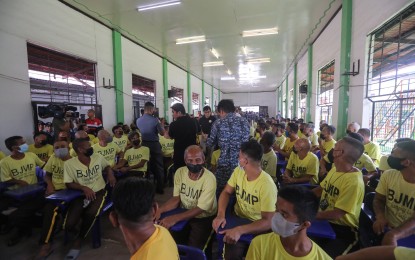
(File photo)
MANILA – The passage of legislative measures aimed at addressing overcrowding in jails is seen as a “long-term” strategy to decongest penal facilities across the country, the Department of Justice (DOJ) said on Friday.
In a Palace press briefing, DOJ spokesperson Mico Clavano said the proposed measure on diversion of adult offenders, the proposed Unified Penology Act, and the proposed creation of the Department of Corrections and Penology are among the bills that the department hopes to be passed into law.
Clavano also cited that the proposed enactment of a law on reintegration and psychosocial rehabilitation, as well as the proposed amendments to the Recognizance Act of 2012 are among the priority bills that they seek to be given clarity after the holding of the National Jail Decongestion Summit on Dec. 6 to 7.
“Mayroon po tayong mga (We have) long-term strategies or long-term goals kung saan puro naman mga batas ang gusto nating isulong (where we are pushing the passage of measures that we support),” he said.
“‘Yun po ‘yung hihingin natin kay Presidente (Ferdinand R. Marcos Jr.) na sana maging priority bill at iyon din po ang ilalapit ho natin sa Kongreso (We will also ask the President to declare those as priority bills and we will also ask Congress to support these [measures]),” Clavano added.
Clavano noted that 70 percent of the Bureau of Jail Management and Penology’s (BJMP) detention facilities are “overcrowded at an average rate of 386 percent”, with the Quezon City male facility having the “highest” congestion rate of 1,330 percent.
He added that the BJMP facilities for female persons deprived of liberty (PDLs) are “more overcrowded than facilities for male PDLs.”
He said the summit will focus on three strategies to address jail congestion, which include reducing admissions, increasing releases by legal means, and expanding capacity of jail facilities.
“Well, really, it’s a humanitarian problem. It’s a human rights problem as well which we are all very aware of. Mayroon po tayong tinatawag na (We have what we call the) Mandela Rules which provides for the minimum standards for treating persons deprived of liberty,” Clavano said.
Citing the formula to measure overcrowding in jails, Clavano said admission of PDLs “should not go over the ideal [capacity].”
“So, if the facility is meant for 7,000, dapat 7,000 lang talaga iyong nakakulong doon (it must only accommodate 7,000 [PDLs]). So, we’re hoping to spread out the PDLs to different facilities considering also kung saan sila nanggaling (where they came from). Let’s say galing sila sa (if they are from) Mindanao, we hope that ‘yung PDL na ‘yun ay maikulong na lang doon sa (those PDLs will be jailed just in) Mindanao so the family and friends can visit. It’s part also of the reformation program,” he said.
Clavano said the Bureau of Corrections (BuCor) also has a plan to create around 16 regional jails as part of the strategies to reduce admissions and increase releases of PDLs.
He said the government is optimistic about the construction of all regional jails under Marcos’ term.
“The plan for BuCor at least is to vacate the New Bilibid Prison before 2028. By that time, we hope to have as many regional jails to be able to fit all the PDLs who are now jailed in the New Bilibid Prison,” Clavano said. (PNA)
